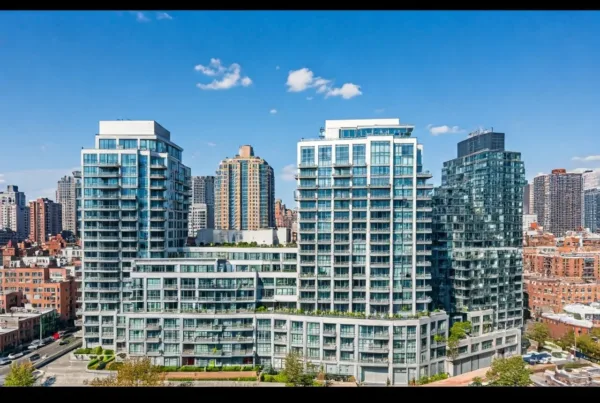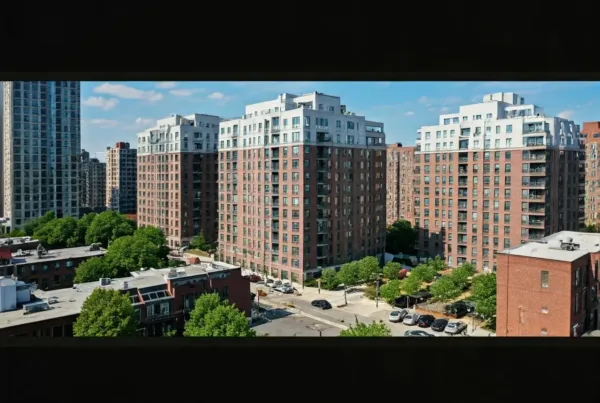Ever wondered how NYC sponsor units work in real estate? Discover the ins and outs of this unique property ownership.
Table of Contents
Introduction to Sponsor Units in NYC
In the bustling city of New York, many people look for apartments to call home. One important type of apartment is called a sponsor unit nyc. But what are sponsor units, and why do they matter? Let’s break it down!
What is a Sponsor Unit?
A sponsor unit is a special kind of apartment that is sold by a company or developer, not by an individual. These units often come from new buildings or from a building that has been repaired or upgraded. When someone buys a sponsor apartment, they are usually buying it directly from the builder. This is different from buying regular apartments, where the owner might have lived there for many years. Sponsor units can sometimes be easier to buy because they don’t have a lot of restrictions that come with other apartments on the market.
Why are Sponsor Units Special in NYC?
Sponsor units are special in New York City for several reasons. First, New York is known for its diverse neighborhoods and unique buildings, making these units a chance for buyers to own a slice of this vibrant city. Second, nyc sponsor units for sale often have a faster buying process. As they are sold directly from the sponsor, the paperwork may be less complicated, making it a quicker option for eager buyers. Lastly, these units can come with fewer purchase restrictions, which makes them attractive for many people looking to invest in real estate in this famous city.
Types of Sponsor Units
In New York City, there are two main types of sponsor units people can look for. These units are often different from regular apartments. Let’s break down what each type is and what makes them special.
Co-op Sponsor Units
A co-op sponsor unit is a type of apartment owned by a company, not by an individual. When someone buys a co-op sponsor unit, they are actually buying shares in the company that owns the building instead of a piece of property. This means that the owner can live in the apartment as if it’s theirs, but they don’t own the real estate outright.
Co-op sponsor units are interesting because they can be a bit easier to buy than other types of homes. If a building is new or has many apartments available, the sponsor may sell these co-op units quickly. Some rules about living in the building may also be a bit more flexible for the sponsor unit co-op than for other residents. So, if you are looking for an apartment, a co-op sponsor unit could be a great option!
Sponsor Apartments
Sponsor apartments are another type of sponsor unit. These are often brand new and have just been built. Unlike co-ops, when you buy a sponsor apartment, you own the actual real estate units. This means you can make changes to the apartment and sell it whenever you want, just like with a normal apartment. Sponsor apartments are often sold directly by the developer, which can make buying one feel a lot simpler.
People like sponsor apartments because they often come with modern features and new appliances. Plus, since they are sold directly, there can be fewer rules compared to other types of apartments. If you want your own space that feels fresh and new, a sponsor apartment could be a wonderful choice!
How Sponsor Units are Sold
When it comes to buying a sponsor unit nyc, the process can be pretty interesting! Sponsor units are different because they are sold directly by the developer or owner, known as the sponsor. Let’s break down how these units are sold in the busy New York City real estate market.
The Sales Process
The sales process for sponsor units starts with the sponsor deciding to sell their real estate units. They will usually list them online, where buyers can see the listings. These listings often include pictures, details about the units, and the price. The important part here is that since the sponsor is selling the unit, they have more control over the sale process. They can set the price and decide how to market the unit.
Begin your search and start earning cash back!
What Buyers Need to Know
For those looking at nyc sponsor units for sale, there are a few important things to keep in mind. First, buyers should understand that sponsor units can sometimes come with fewer rules compared to other units, like co-op sponsor units. This can make the buying process easier and quicker.
Another key point is to be aware of any fees. Sponsor units might have different fees than regular apartments. Buyers should carefully review any documents before making a decision. It’s also a smart idea for buyers to see how much the sponsor is asking compared to similar real estate units in the area. This will help them know if the price is fair or not. Overall, being informed and ready can help make the process smoother for buyers looking to purchase a sponsor unit co-op.
Benefits and Downsides of Sponsor Units
Sponsor units in NYC come with some great benefits. First, buying a sponsor unit nyc can be a speedy process. Since these units are already owned by the sponsor, you don’t have to wait for a long approval or go through many extra steps. This can make moving in much faster!
| Sponsor Type | Definition |
|---|---|
| Owner Sponsor | A unit owned by the developer or original owner of the building, which they lease or sell to tenants. |
| Investor Sponsor | A unit owned by an investor who purchases the property and retains control over the rental or sale of the unit. |
| Non-Profit Sponsor | An organization that owns housing units and rents or sells them to individuals or families in need of affordable housing. |
| Municipal Sponsor | A government entity that sponsors units within a building for low-income or special needs populations. |
Another benefit is that co-op sponsor units often require fewer board approvals. This is helpful for many buyers who might not want to deal with long waiting times. Plus, in some cases, sponsor units might need less paperwork, which can make the whole buying process simpler.
Many people also appreciate the chance to pick from a range of real estate units that are in great locations. NYC sponsor units for sale can often be located in desirable neighborhoods, allowing you to live close to fun activities and convenient services.
Additionally, sponsor units are sometimes available at competitive prices. They can be priced to sell, offering a good deal compared to other options in the market. So, whether you’re looking for your first home or a new place, sponsor apartments may give you a great chance to find what you need.
Downsides
While there are many benefits, there are also some downsides to consider. Buying a sponsor unit co-op may come with a higher price upfront. Sometimes, buyers might notice that these units initially seem more expensive than similar properties.
Another downside could be the lack of negotiation. When it comes to sponsor units, the seller may not be open to negotiating the price, as these units are often sold at fixed amounts. This means you might not be able to get a lower deal like you could with other types of real estate units.
Also, some sponsor units may have restrictions. For instance, owners might need to follow specific rules from the sponsor, which can include limits on renovations or renting the unit in the future. These rules can feel a bit tight for some homeowners.
Lastly, sometimes the units need repairs or updates. While some sponsor apartments are ready to move in, others might need a little work. This means you may need to invest extra time and money after you buy the unit to make it perfect for you.
Real-life Examples
Let’s look at a real co-op sponsor unit that is for sale in NYC. Imagine a bright, sunny apartment located on the 5th floor of a cozy building in Brooklyn. This co-op sponsor unit has two bedrooms and is perfect for a small family. It has a big window in the living room that lets in lots of natural light, making the space feel warm and welcoming.
The owner of this co-op sponsor unit is the developer, so the unit is ready to go for buyers. This means that you don’t have to wait for any approvals from a board, which can make the buying process quicker. The asking price is reasonable, making it an exciting opportunity for families looking to move into the area without many hurdles.
Example 2: Sponsor Apartment
Now, let’s check out a sponsor apartment that’s available for sale in Manhattan. This sponsor apartment is a modern one-bedroom unit located in a trendy neighborhood. It’s designed with sleek finishes and has a beautiful open kitchen, which is ideal for cooking and entertaining guests.
What makes this NYC sponsor apartment special is that it has low maintenance fees compared to other apartments. Owners benefit from this because they can save money in the long run. Additionally, it’s already empty, so anyone interested can move in right away. This makes it a great choice for young professionals who want a hassle-free living experience.
Summary
In this blog post, we explored the intriguing world of sponsor units in NYC. These unique real estate units play an important role in the New York City housing market. Basically, a sponsor unit is a type of apartment that the developer or sponsor owns and sells directly. We learned that these units can be quite special in NYC because they offer some unique benefits, especially when compared to regular co-op apartments.
We talked about different types of sponsor units, including the co-op sponsor unit and sponsor apartments. Co-op sponsor units can be found in buildings owned by a cooperative, while sponsor apartments are typically sold more freely and might be easier to own. Understanding these distinctions can help potential buyers make informed decisions.
When it comes to selling NYC sponsor units for sale, the process is quite straightforward. The units are placed on the market directly by the sponsor, which often simplifies things for buyers. However, it’s also important for buyers to know a few key points before they make a purchase.
We also highlighted the benefits and downsides of buying a sponsor unit. On the positive side, sponsor units can mean less competition and better purchasing terms. But, there can be challenges too, such as higher costs or specific regulations to follow. Overall, understanding these points is essential for anyone considering a sponsor unit co-op.
Lastly, we covered real-life examples of sponsor units, giving readers a clearer picture of what to expect. From specific co-op sponsor units to detailed descriptions of popular sponsor apartments, these examples help show just how varied and interesting this market is in NYC.
By wrapping up our exploration of sponsor units, we hope you now have a better understanding of this unique aspect of New York City’s housing landscape.
FAQs
What’s the Difference Between a Co-op and a Sponsor Unit?
A co-op, short for cooperative, is a type of housing where you buy shares in a company that owns a building. This means you don’t actually own the apartment itself; you own part of the company. A sponsor unit nyc is a specific kind of unit sold directly by the developer or building owner. In simple terms, while a co-op sponsor unit is owned by the co-op, a sponsor unit is owned by the developer and is often ready to sell right away.
Are Sponsor Units Cheaper?
Not necessarily! Some people think that sponsor units nyc might be cheaper because they’re sold directly by the developer. However, the price can really depend on many things, like the location, size, and current real estate market. Sometimes, co-op sponsor units can have lower costs because they don’t require as much extra paperwork. But other times, they can be just as expensive or even more so than other types of apartments. It’s always best to compare prices and see what works for your budget.
How Do I Find Sponsor Units for Sale?
If you’re looking for nyc sponsor units for sale, start by checking online real estate websites. You can also visit real estate offices in New York City. Many listings for sponsor apartments are posted on these sites. Additionally, talking to a real estate agent who knows about these special units can help. They can guide you to find what you need and answer any questions you might have.







